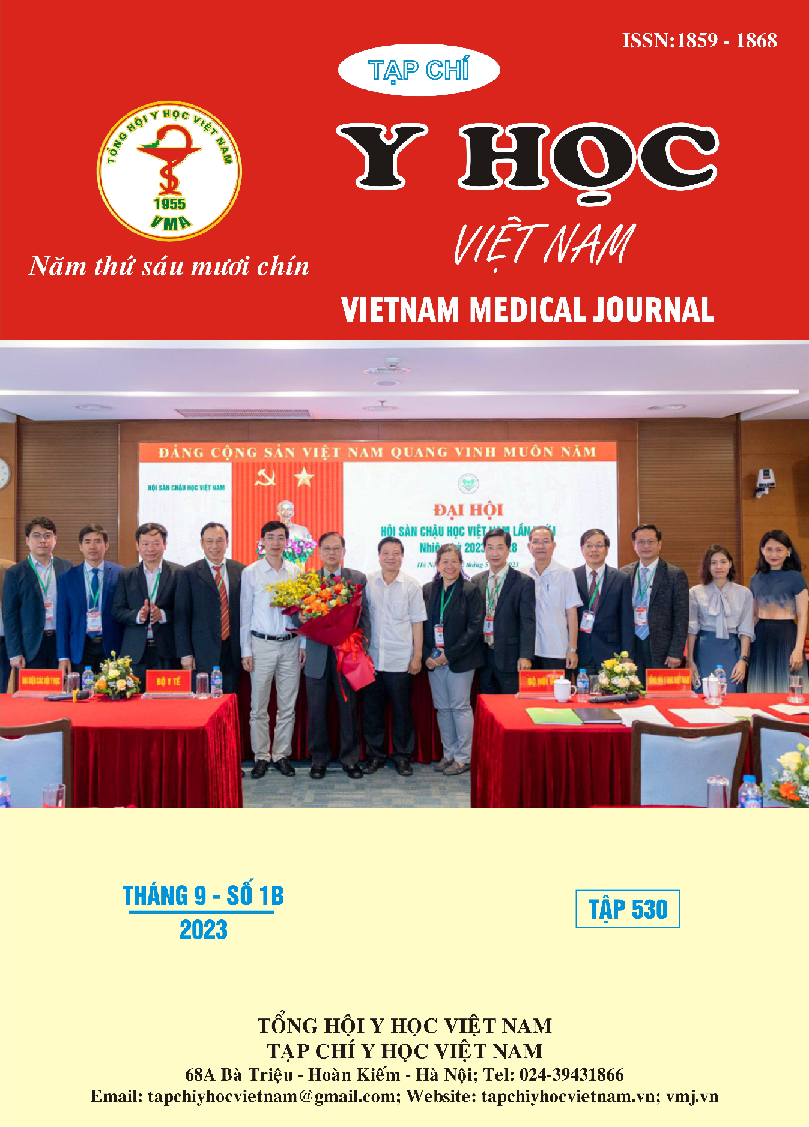KẾT QUẢ ĐIỀU TRỊ BƯỚC 1 UNG THƯ PHỔI KHÔNG TẾ BÀO NHỎ CÓ ĐỘT BIẾN EGFR BẰNG TKIS THẾ HỆ 1 TẠI BỆNH VIỆN HỮU NGHỊ
Nội dung chính của bài viết
Tóm tắt
Mục tiêu: Mô tả một số đặc điểm lâm sàng và cận lâm sàng của bệnh nhân ung thư phổi không tế bào nhỏ có đột biến EGFR được điều trị bằng TKIs thế hệ 1 tại Bệnh viện Hữu Nghị. Đánh giá kết quả điều trị và một số tác dụng phụ không mong muốn của nhóm bệnh nhân nghiên cứu. Đối tượng và phương pháp nghiên cứu: 67 bệnh nhân được chẩn đoán ung thư phổi giai đoạn IIIb-IV được điều trị TKIs thế hệ 1 (Erlotinib hoặc Gefitinib) tại Bệnh viện Hữu Nghị từ 6/2015 đến 05/2023. Kết quả: Bệnh nhân trong nghiên cứu phần lớn ở độ tuổi cao với tuổi trung bình là 73,6, cao nhất là 88. Tỷ lệ nam cao hơn nữ (2,7/1). Các triệu chứng đầu tiên hay gặp nhất là ho kéo dài, mệt mỏi và đau ngực. Bệnh nhân chủ yếu được chẩn đoán bệnh ở giai đoạn IV. Vị trí u hay gặp ở thùy trên hai phổi (56,7%), tế bào u phần lớn thuộc nhóm carcinoma tuyến (97%). Đột biến gene EGFR hay gặp nhất ở exon 19 (58,2%). Đáp ứng điều trị với TKIs thế hệ 1 trên nhóm bệnh nhân nghiên cứu sau 3 tháng: tỷ lệ đáp ứng toàn bộ: 73,1%, tỷ lệ kiểm soát bệnh: 95,5%. Các triệu chứng lâm sàng cải thiện sau 2-4 tuần và còn giảm tiếp theo thời gian dùng thuốc. Các tác dụng phụ thường gặp là: viêm móng, mệt mỏi, tăng men gan, ban dạng mụn, thường gặp ở mức độ nhẹ, tỷ lệ gặp tác dụng phụ mức độ vừa-nặng cần giảm liều hay đổi thuốc khá thấp. Kết luận: Điều trị TKIs thế hệ 1 đối với bệnh nhân ung thư phổi không tế bào nhỏ có đột biến EGFR cho kết quả tốt và độc tính ở giới hạn chấp nhập được.
Chi tiết bài viết
Từ khóa
Ung thư phổi không tế bào nhỏ, đột biến EGFR, TKIs.
Tài liệu tham khảo
2. Mok TS, Wu YL, Thongprasert S, et al. Gefitinib or Carboplatin–Paclitaxel in Pulmonary Adenocarcinoma. N Engl J Med. 2009; 361(10):947-957. doi:10.1056/NEJMoa0810699
3. Zhou C, Wu YL, Chen G, et al. Erlotinib versus chemotherapy as first-line treatment for patients with advanced EGFR mutation-positive non-small-cell lung cancer (OPTIMAL, CTONG-0802): a multicentre, open-label, randomised, phase 3 study. Lancet Oncol. 2011;12(8):735-742. doi:10.1016/S1470-2045(11)70184-X
4. Rosell R, Carcereny E, Gervais R, et al. Erlotinib versus standard chemotherapy as first-line treatment for European patients with advanced EGFR mutation-positive non-small-cell lung cancer (EURTAC): a multicentre, open-label, randomised phase 3 trial. Lancet Oncol. 2012;13(3): 239-246. doi: 10.1016/ S1470-2045(11) 70393-X
5. Kobayashi S, Boggon TJ, Dayaram T, et al. EGFR Mutation and Resistance of Non–Small-Cell Lung Cancer to Gefitinib. N Engl J Med. 2005; 352(8): 786-792. doi: 10.1056/ NEJMoa044238
6. Hiếu NV, Đại LC, Quảng LV. Ung Thư Học. Nhà xuất bản Y học; 2015.
7. Porta R, Sánchez-Torres JM, Paz-Ares L, et al. Brain metastases from lung cancer responding to erlotinib: the importance of EGFR mutation. Eur Respir J. 2011; 37(3): 624-631. doi: 10.1183/ 09031936. 00195609
8. Wu YL, Zhou C, Cheng Y, et al. Erlotinib as second-line treatment in patients with advanced non-small-cell lung cancer and asymptomatic brain metastases: a phase II study (CTONG-0803). Ann Oncol Off J Eur Soc Med Oncol. 2013;24(4):993-999. doi:10.1093/annonc/mds529


